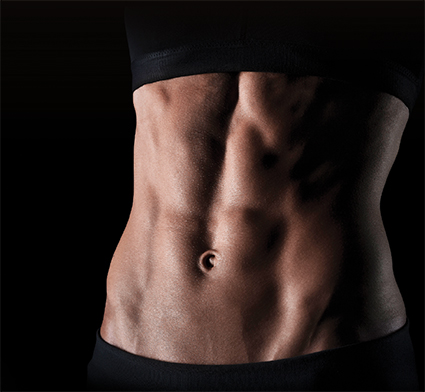Is There an Upper Limit to Caffeine Intake for Fat Loss?

What’s the point of diminishing returns or adrenal burnout?
Caffeine is one of the most heavily studied and most effective performance enhancing supplements available. Caffeine increases resting energy expenditure, fat oxidation rate, and diet-induced thermogenesis. Supplementation with caffeine increases fat loss primarily through two major mechanisms. First, it acts as an adenosine receptor antagonist, which results in greater norepinephrine and epinephrine output. Second, caffeine is a phosphodiesterase inhibitor, which prolongs the activity of cyclic AMP (cAMP) in cells. cAMP is a key secondary messenger and one of the most important cell-regulating compounds involved in fat loss. Stopping the breakdown of cAMP results in a prolonged effect of cAMP-dependent pathways, which includes regulation of glycogen, blood sugars, and fat metabolism. Further to that, prolonging cAMP’s actions increases the release and mobilization of fat from fat cells, allowing them to be burned off during exercise, or even while at rest. Increased cAMP activity also results in greater release and availability of norepinephrine—one of the key hormones involved in fat burning.
 The most effective dosage of caffeine for fat loss varies from person to person, depending on their natural tolerance and their health and fitness status. Fit and lean individuals gain much greater fat-loss benefits from caffeine than overweight and unfit individuals do. In overweight people, caffeine is more likely to encourage insulin resistance, which isn’t good for fat loss or overall health. Chronic high-dose caffeine intake can also induce adrenal fatigue. When you take in caffeine, your body sends a message to the pituitary gland to release adrenaline (epinephrine) and cortisol. This is a normal process and should occur, but after long-term regular intake of caffeine, your adrenal glands are weakened and less able to respond adequately. This is adrenal fatigue. That’s why it’s important to cycle on and off of caffeine if you are taking in significant amounts of it on a regular basis.
The most effective dosage of caffeine for fat loss varies from person to person, depending on their natural tolerance and their health and fitness status. Fit and lean individuals gain much greater fat-loss benefits from caffeine than overweight and unfit individuals do. In overweight people, caffeine is more likely to encourage insulin resistance, which isn’t good for fat loss or overall health. Chronic high-dose caffeine intake can also induce adrenal fatigue. When you take in caffeine, your body sends a message to the pituitary gland to release adrenaline (epinephrine) and cortisol. This is a normal process and should occur, but after long-term regular intake of caffeine, your adrenal glands are weakened and less able to respond adequately. This is adrenal fatigue. That’s why it’s important to cycle on and off of caffeine if you are taking in significant amounts of it on a regular basis.
So, what’s an appropriate dosage of caffeine for fat loss? Let’s review a few key studies that can help us qualify an appropriate dosage range.

 Study #1: Dulloo AG, et al. Am J Clin Nutr. 1989;49:44-50.
Study #1: Dulloo AG, et al. Am J Clin Nutr. 1989;49:44-50.
Single-dose oral administration of 100 milligrams of caffeine increased the resting metabolic rate of both lean and post-obese volunteers by 3 to 4 percent over 150 minutes and improved the defective diet-induced thermogenesis observed in the post-obese subjects. Measurements of energy expenditure in a room respirometer indicate that repeated caffeine administration (100 milligrams) at two-hour intervals over a 12-hour day period increased the energy expenditure of both subject groups by 8 to 11 percent during that period but had no influence on the subsequent 12-hour night energy expenditure. The net effect was a significant increase in daily energy expenditure of 150 calories in the lean volunteers and 79 calories in the post-obese subjects. The researchers concluded that caffeine at a daily dose of 600 milligrams can have a significant influence on energy balance and may promote thermogenesis in the treatment of obesity.
Study 2: Acheson KJ, et al. (1980). Am J Clin Nutr. 1980;33:989-997.
A series of four trials was carried out to investigate the effects of caffeine and coffee on the metabolic rate and substrate utilization in normal weight and obese individuals. In the first trial, 8 milligrams of caffeine per kilogram of body weight (so, 720 milligrams for a 90-kilogram person) was compared with a placebo in normal weight subjects. Metabolic rate increased significantly during the three hours after caffeine ingestion. While plasma glucose, insulin, and carbohydrate oxidation didn’t change significantly, plasma free fatty acid levels rose and were accompanied by significant increases in fat oxidation during the last hour of the test. In the second and third trials, the effects of coffee providing 4 milligrams of caffeine per kilogram of body weight (so, 360 milligrams for a 90-kilogram person) were studied in control and obese subjects. Metabolic rate increased significantly in both groups; however, significant increases in fat oxidation were observed only in the control group. Plasma free fatty acids didn’t change in the obese. In the fourth trial, coffee was taken with a 740-calorie meal. The thermic effect of the meal was significantly greater after coffee than after decaffeinated coffee, and again fat oxidation was significantly greater after coffee. The researchers concluded that caffeine/coffee stimulates the metabolic rate in both control and obese individuals; however, this is accompanied by greater oxidation of fat in normal weight subjects.
 Study 3: Costill DL, et al. Med Sci Sports. 1978;10:155-158.
Study 3: Costill DL, et al. Med Sci Sports. 1978;10:155-158.
To assess the effects of caffeine ingestion on metabolism and performance during prolonged exercise, nine competitive cyclists exercised until exhaustion on a bicycle ergometer at 80 percent of VO2 max. One trial was performed an hour after ingesting decaffeinated coffee while a second trial required that each subject consume coffee containing 330 milligrams of caffeine 60 minutes before the exercise. Following the ingestion of caffeine, the subjects were able to perform an average of 90.2 minutes of cycling as compared to an average of 75.5 minutes in the non-caffeine trial. Measurements of plasma free fatty acids, glycerol, and respiratory exchange ratios evidenced a greater rate of fat metabolism during the caffeine trial as compared to the non-caffeine exercise treatment. Calculations of carbohydrate metabolism from respiratory exchange data revealed that the subjects oxidized roughly 240 grams of carbs in both trials. Fat oxidation, however, was significantly higher during the caffeine trial than in the non-caffeine trial.
Based on the results of the three studies summarized here and the body of research currently available, it appears that healthy, fit individuals can enhance fat oxidation, energy expenditure, and overall metabolic rate by supplementing with a daily dose of approximately 330 to 720 milligrams of caffeine (in divided dosages). Again, it’s important to remember that everyone has a different tolerance to caffeine, so make sure to gradually assess your individual tolerance and make sure you cycle off of it on a regular basis (at least every 8 to 12 weeks) in order to prevent adrenal fatigue.

